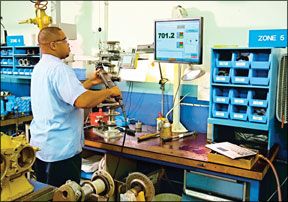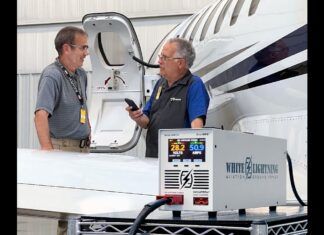What exactly is the difference between a factory rebuilt, a factory overhaul and a field overhauled engine? And is opting for the factory version worth the extra money? As the engine overhaul business has become ever more competitive, there’s even more confusion about the difference between categories and sources. Hardly a month goes by when someone doesnt phone to ask: “here are the numbers the shops are giving me. What should I do?” In this article, we’ll take a look at key differences between field and factory overhauls and define rebuilt engines. But fair warning: its not exactly a level playing field. Not all field overhauls are the same, so you need to ask the shop a lot of detailed questions to compare one shop against another. And the advice that applied five years ago still applies: Dealing with a known shop with a national reputation remains the best way to have a satisfactory overhaul experience.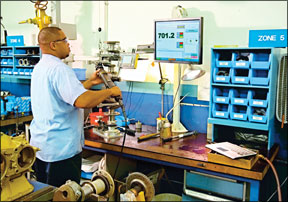
Guidelines
We can only scratch the surface of this subject in this article-this topic warrants an entire book. In general, we tilt toward only factory or FAA-certified repair station overhauls. This means the facility has met FAA standards to operate under Part 145, a more tightly regulated and focused maintenance environment than a typical multi-purpose FBO. Part 145 shops must have a training program, a quality-control program and do much more to meet higher FAA Part 145 certification standards.
In our opinion, anything less is shifting the burden to you, the customer, to evaluate every aspect of a non-Part 145 shop to see if it meets quality and technical standards for performing overhauls as we’ll as a Part 145 shop does. But the catch-and there always is a catch-is that any shop can be every bit as good as a Part 145 entity but not be certified under Part 145. If you judge a shop by known, reliable reputation, the 145 cert may be less important to you. There is an FAA advisory circular listing every Part 145 repair station as we’ll as certified specialties (AC 140-7S). Its on the Web with search functions at http://av-info.faa.gov/repairstation.asp
Overhaul, Reman, Rebuilt
These three terms are the source of constant confusion. The word “remanufactured” isn’t even an FAA-recognized maintenance term. And different terms can make for thousands of dollars of price difference in your overhaul. The word remanufactured sounds more “thorough” so you see it used more than “rebuilt”
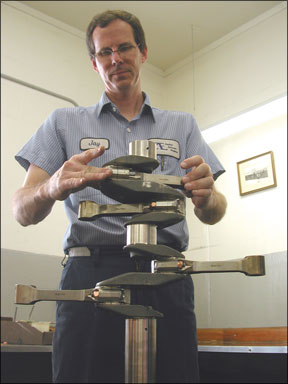
225
in sales literature. Often, remanufactured and rebuilt are considered synonymous in the field-but verify with the vendor exactly what they mean. See below.
An overhaul, on the other hand, is strictly defined. FAR 43.2 (a) describes an overhaul as “using methods, techniques and practices acceptable to the Administrator…it has been disassembled, cleaned, inspected, repaired as necessary and reassembled.” The regulation also requires testing and specific documentation required by the FAA.
Currently, field shops use the term “overhauled to manufacturers new fits and tolerances,” rather than calling it a rebuilt engine. What you want is an engine built to new fits and according to the factory overhaul manual table of limits, something understood by all. Its essential for both you and the shop to clearly be in agreement with what you want and any contract or quote should say so in writing.
Sea Change
During the 1970s, the engine factories made their money on new engines, with little regard for the overhaul business. Not anymore. Overhauls now represent a significant part of factory business. The cost of a factory-new engine makes an overhaul of some type the only financially reasonable alternative for most owners, so the factories have long been competing with the very shops that they previously had a more paternal relationship with as distributors.
This huge shift in the overhaul market and escalating cost of parts has been one of the reasons that the aftermarket parts industry has grown. You can buy virtually every part of some of the more common engines from aftermarket sources such as Superior Air Parts or ECI. In our opinion, these are as good as factory parts, on the
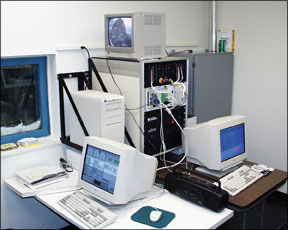
whole. The factories are less sanguine on parts quality, but were sure the competition has put downward pressure on escalating factory parts prices.
There are several key factors that significantly influence the engine buying decision. If you insist on a zero-time engine with a zero-time logbook, only the factory reserves the right to provide it. But, as is always the case, cost has to impact the equation and sometimes rules it. If a premium overhaul from a known shop costs half what a zero-time engine from the factory does, we don’t think zero-time is worth twice the money.
In making your overhaul decision, the specific type and version of engine you have may rule your choice. The more unusual or complicated, the better the factory option seems to be as a source for expertise and parts. But there are limits. Its possible the factory will no longer have parts for rare or unusual engines. In that case, salvage yards or some overhaulers with decades in the business with extensive inventories, such as Certified Engines (see table) in Opalocka, Florida, may save the day.
For a relatively common engine with high time-assuming the engine still operates-the factory often represents the best option since youre likely to have non-serviceable parts that will need replacement, but that wont affect your core credit. Field overhaul quotes are based upon serviceable sub-assemblies, such as crankshafts, crankcases and other components.
That means that a high-time, multi-run engine can cost far more from an overhauler because of an accumulation of upcharges for non-serviceable parts. Conversely, on a first-run engine, there’s a lower likelihood that major components will be worn beyond reusable limits, so your costs on a first-run engine should hover near the basic quotes that you get from a field shop and these will likely be lower than the factory numbers.
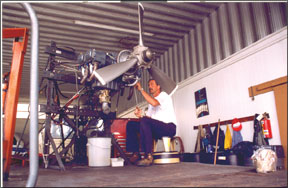
If your crankshaft is scrap, the shop will charge extra for a new or serviceable crank, where the factory wont (at least Lycoming) as long as your old engine arrives in operable condition for a core credit. don’t expect to send an inoperable engine to the factory and get core credit.
On the other hand, a field shop is the better choice for a first-run engine with a known good crank and case. Why? You get to keep your low-time parts, not counting accessories, which should be inspected and rebuilt, not exchanged. Sometimes, there are special circumstances. Some years ago, TCM wasnt charging extra to provide a new VAR crank to IO-520 customers turning in a non-VAR crank. TCM wanted to get non-VAR cranks off the market and would pay to do it. But factory largesse comes and goes.
By using such tricks as undersized bearings, a factory-rebuilt engine can reuse parts from any core as long as they meet new tolerances. You also have the choice with Lycoming to have the factory overhaul or rebuild your current engine and keep all the original reusable components. Your accessories will be rebuilt by the manufacturer or replaced with new-the alternator may or may not be included, so ask. Price should be the same as a factory rebuilt or overhaul, depending on what you specify.
Another caveat is to never use a shop that doesnt overhaul engines like yours as a matter of course. The last thing you want is for a shop to educate itself on your dime. And don’t be swayed by a slick Web site. Flashy graphics with glowing testimonials don’t guarantee satisfaction. What you need is good, reliable first-hand references and no pattern of complaints.
And speaking of complaints, T
rade-a-Plane has lots of ads from shops offering $4000 to $8000 overhauls-guaranteed. We simply cant say this in strong enough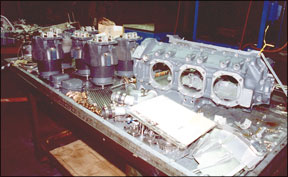
terms: Avoid these lowball shops. No matter how low their overhead, they simply cant compete with the quality of a known shop, much less the factory.
A dip-and-strip shop wont offer as many new parts-if it offers any-as will a reputable shop, but the overwhelming pain will be caused by warranty performance. Thats built into a reputable shops price, but don’t expect the same support from a shop charging half as much.
Warranties
Competition has forced shops to improve warranty offerings, often exceeding what the factory will provide. A few warranty examples: All Penn Yan Aero overhauled engines are warranted 100 percent parts and labor for two years or 500 hours, whichever occurs first, prorated to TBO. Accessories are warranted for one year. The Lycoming warranty for a rebuilt engine is 12 months from the date of first operation, then prorated through the second year.
A Continental factory rebuilt warranty is one year parts and labor. Top Care cylinders are three years/1000 hours, but only the first year is parts and labor; second and third are parts only. don’t assume that warranties are similar enough not to require careful comparison and don’t buy an overhaul from a shop that wont furnish a detailed written warranty.
Last, don’t forget the “phantom warranty.” This occurs when you encounter a problem we’ll outside the stated warranty, but the field shop works with you to fix the engine anyway. For instance, our Mooneys TSIO-360 developed a minor oil leak we’ll past Zephyr Engines agreed warranty. The shop fixed the leak at no charge to us. Many of the better shops do this. Good luck getting a factory to do the same, although the distributor who sold you the engine might help. The overhaul shop requirement for up-front deposits varies from zero (common) for a typical engine to as much as one-third the quote, especially for unusual engines. Ask ahead of time. If the shop asks for more, ask why and cite the average.
Reused Parts
By having your first-run engine overhauled by a high-end shop, you’ll have direct knowledge of just how old the components that make up the engine are, a distinct advantage. A factory engine will probably have more new parts and definitely new cylinders. Field shops often quote three prices-one for overhauled cylinders, one for factory cylinders and one for aftermarket cylinders. On the upside, from a field shop, you can get any type of cylinder you want-factory new, Superior Millenniums, ECIs Nickel+Carbide, overhauled cylinders. But each will carry a different price.
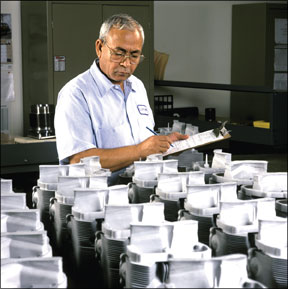
As for new parts, Lycoming has three engine categories: overhauled, in which parts meet factory in-house service limits; rebuilt, where the engine is given a new data plate and a zero-time log book and all parts must meet new limits and brand-new engines, with all new parts.
Continental has an additional engine choice with the help of their Teledyne Mattituck Services operation. You can get a brand-new or rebuilt engine from the factory or Mattituck can overhaul your existing engine to new limits, with continuation of engine time. The overhauled engine has only a one-year/240-hour (whichever is first) warranty, then prorated to TBO or 40 hours a month, whichever is greater. The cylinders used on the overhaul are not the Top Care type. Continental also has two special edition new engines with both cosmetic and internal upgrades such as flow-matched cylinders, but TCM tech services told us these were essentially reserved for OEM sales.
Both Lycoming and Continental have service literature mandating certain parts be replaced 100 percent at overhaul. This list is long and not the same for both factories. For Lycoming, it can be found in SB 240T and for Continental in SB 97-6, both available on the companies respective Web sites. The important point is that Part 145 shops will also replace these parts. The reality is they only have to comply with ADs, not bulletins, but Part 145 shops also comply with any bulletins considered important, essential or critical-but not necessarily every one, unless they state that they do. Penn Yan, for example, says they comply with all bulletins.
How about a factory rebuilt engine for $300 over invoice? Log on to http://www.vanbortel.com/ (800-759-4295), type in your engine model and a discount price pops back. Van Bortel is not an authorized Lycoming distributor, so the prices may not be as low for Lycoming as you expect. This company has been around for decades and they offer factory rebuilt engines and some factory overhauls, some new engines and lower cost overhauled versions (including Lycomings) listed as overhauled by Teledyne. Warranty support for a Van Bortel-sold factory rebuilt is the same as any factory rebuilt. (Lycoming confirmed this.) Van Bortel simply buys through an approved Lycoming distributor and marks it up less. If price and timing are right and the engine meets your desires, we see no reason not to buy from Van Bortel.
Shop Evaluation
The factory is the factory, no matter who you buy the engine from. Distributors who are also engine shops may, however, do a better job of after-purchase support. Top engine shops, on the other hand, got to be top shops not necessarily because they make better engines, but because theyve built a loyal customer base through exceptional service and standup warranty performance. The key in shop selection, then, is reputation. Price is a driver, but not
the driver. How to obtain reliable referrals? Type clubs for your airplane generally have an excellent network of member feedback on shops. Advertising in a club magazine is not necessarily an endorsement by the type club, unless it says so. (Shops pay for ads.) Direct recent experience of someone you know also counts heavily as a good referral. We recommend building a spreadsheet or a notebook with comparative quotes from at least three shops and, of course, the factory.Shop information and performance isn’t static. Management, ownership, press, FAA sanctions, warranty policy, prices, whats included in the overhaul, areas of expertise, waiting time and more all change like the weather. Its the nature of business, especially small business and definitely the engine business. If a friend had great luck two years ago, check to see if ownership and management are unchanged. Reliable information has a short shelf life.
Where practical, visiting the shop is a good idea. Thats another reason we favor using a shop nearby. But often, you just wont have the time or opportunity. If you do visit, look for a dedicated engine assembly area-a clean room-and have the shop show you how they QC cylinders and other parts before installation.
Ask for a list of current customers to buttress your referral efforts. Find out if the shop overhauls your type of engine frequently, or has never done an engine like yours. Make sure they perform test runs and provide you with test results. We recommend against the first run being in the airplane after installation. Get a copy of the written warranty and compare it to competing bids. Increasingly, there are differences in warranties. Does the shop comply with factory bulletins or just required ADs? Whats the deposit requirement, if any, and how long will the job take?
The takeaway is this: There are certain circumstances in which the factory engine will be the only smart choice and a reputable shop will tell you as much. But if you prefer a field shop, there are plenty to pick from and the good ones havent lasted this long by turning out shoddy work.
Kim Santerre is editor of
Light Plane Maintenance magazine.
